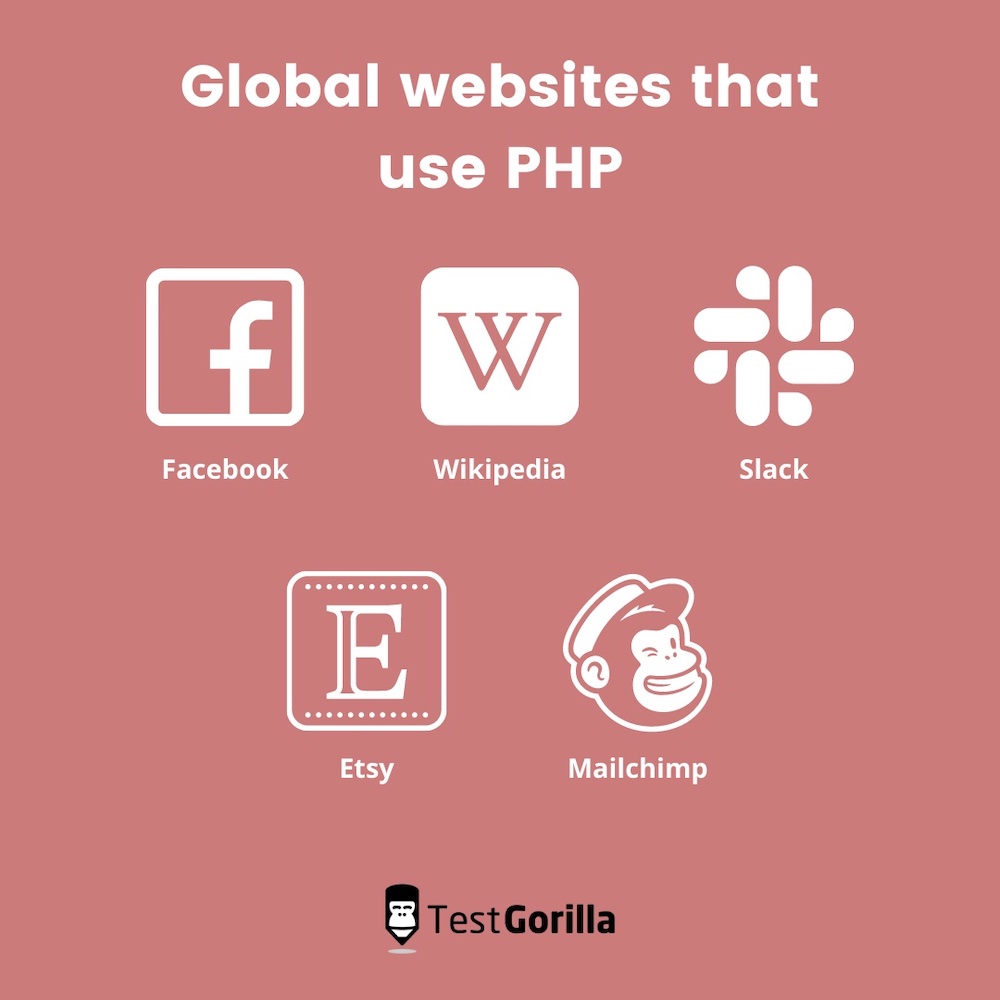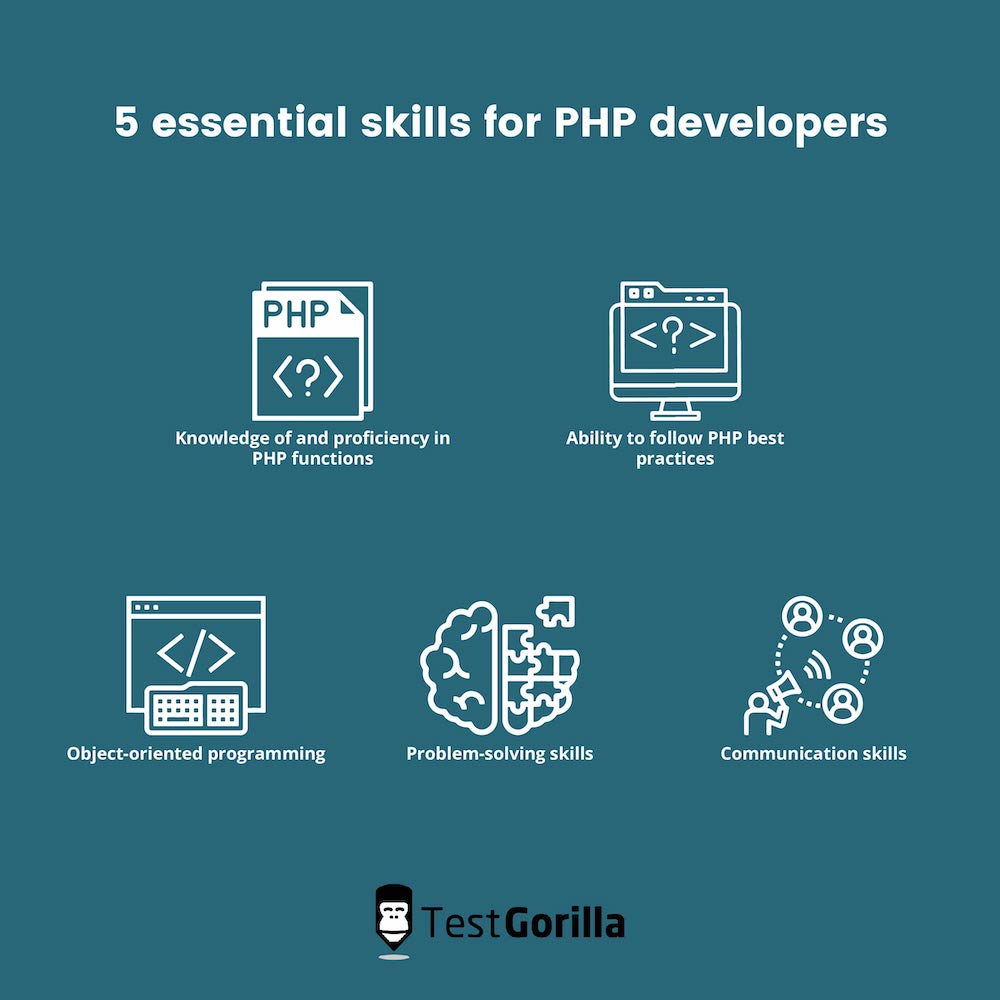5 problems a PHP developer can solve for your application or website
PHP is commonly claimed as the best programming language in the world for commercial projects. It can be used to build websites and applications in an efficient, secure, and scalable manner, but PHP alone won’t carry the success of a project.
To make the most of the language to build the best possible platforms, businesses need to hire top-tier developers who can use PHP to its full potential.
Hiring a PHP developer? Read on for a breakdown of the skills you should be looking for in your candidates and an exploration of five problems a PHP developer can solve for your application or website.
What is PHP?
PHP is a server-side scripting language, embedded in HTML, that is used by programmers and developers to develop dynamic websites and applications. It’s been around for a long time: It was originally created in 1994 and has since been adjusted over and over again.
PHP is open-source and general-purpose, so it’s a popular and highly practical language. As of May 2022, W3Techs reports that it is used by 77.4% of websites whose server-side language is known.
Confusingly, PHP stands for PHP: Hypertext Processor. Yes, the P in PHP stands for PHP. We call an acronym that refers to itself like this a recursive acronym – originally, PHP stood for Personal Home Page.
Common uses of PHP in web development include, but are not limited to:
Performing system functions like creating, opening, reading from, writing to, and closing files
Adding, deleting, and modifying elements within a database
Accessing cookie variables and setting cookies
Restricting user access to certain web pages
Encrypting user data to enhance privacy
Connecting web pages with databases
Counting the visitors on a site at any given time
PHP is still a top choice for web development because it’s easy to use. It’s also open-source, and therefore free. It’s fast and secure, and is highly versatile, with a strong and loyal community behind it.
Because it’s been around for so long, it’s been tried and tested in real-life scenarios far more than other programming languages. Facebook and WordPress are probably the most famous examples of software written on PHP. It’s a reliable veteran, trusted by developers everywhere.
PHP developers: Who are they and what do they do?
PHP developers, also known as PHP engineers, are a subcategory of developers who use PHP to write server-side web application logic. They are responsible for testing, troubleshooting, and maintaining the code. Their duties usually include:
Writing back-end PHP code to create or modify software and applications
Developing, testing, and launching website applications with precision and efficiency
Analyzing website and application requirements
Identifying and then solving issues that involve scripting in CSS and HTML
Setting and meeting performance objectives for client systems
Most of the time, PHP developers will work as part of a team of developers or engineers. But smaller businesses and organizations tend to seek very well-rounded developers since they don’t have the resources to recruit a whole team with people for each specialist task.
Although different PHP developers will be experts in different areas, it’s a good idea to keep your general PHP proficiency up to scratch if you want to be a competitive candidate for companies.
The best insights on HR and recruitment, delivered to your inbox.
Biweekly updates. No spam. Unsubscribe any time.
5 essential skills for PHP developers
Knowledge of and proficiency in PHP functions
This is an obvious one. To be a good PHP developer, you need to have mastered basic PHP skills. This means you’ll have a strong grasp of the language, its operations, its functions, and its applications.
PHP developers should also be familiar with some of PHP’s frameworks; Laravel is the most popular, Symfony, CodeIgniter, and Zend are some other examples. You can read our blog post about PHP Laravel developers to find out more about what they do specifically.
They may also need to have some knowledge of other programming languages. Knowing PHP alone sometimes won’t be enough. An understanding of some front-end languages, like JavaScript, CSS, and HTML, will help them spot and correct web design errors.
Ability to follow PHP best practices
PHP has been around for a long time and has undergone many adjustments and updates. Its popularity means it evolves quickly, and countless frameworks have been born and died as people try to get the best out of it.
This means there’s lots of outdated information around, and it can lead to bad PHP practices and ineffective code. There are living PHP information documents scattered about online to try and combat this, but some general best practices for PHP developers include:
Make your code concise and readable, and document it properly. This is a golden rule for anyone writing code. That being said, don’t over-comment your code: Documentation is important, but save it for the most complicated parts of your source code.
Make the most of core functions and classes. Chances are there’s already one that covers what you’re trying to do, so developers should check the PHP manual before creating their own functions.
Use the PHP Standard Recommendation (PSR). Published by the PHP Framework Interoperability Group (PHP-FIG), PSR is a specification that aims to standardize programming concepts in PHP. It’s especially useful when coders are collaborating across multiple projects.
Use a good source editor. A good text editor saves developers time by helping them avoid syntax errors. Most will have handy features to optimize workflow, like code hinting or code navigation.
Keep code snippets. This could save you lots of time – PHP developers will end up coding a lot of the same things throughout their careers. There are plenty of apps designed to help developers collect and keep code snippets.
Create a master file, or configuration file, for your database connection settings. This will make your code easier to maintain, especially when you’re working with certain constants and functions through multiple scripts.
Turn on error reporting in the development stages of application-building. Developers should do this to identify run-through errors as soon as possible – the sooner you know an error is there, the faster you can fix it.
It’s essential that PHP developers follow best practices, and keep a finger on the pulse of how the language is changing.
Object-oriented programming
Object-oriented programming (OOP) is a type of programming that relies upon objects and classes to organize software design, rather than using functions and logic like procedural programming does. An object is defined as a data field that has unique attributes and behaviors, and a class is just an organizational unit (so objects are organized by development classes).
Basically, procedural programming involves writing procedures or functions which then perform operations on your data, and object-oriented programing is about creating objects that contain functions and data.
The latest versions of PHP are object-oriented, meaning functionality is built into objects and developers can write their classes to organize them. However, PHP is not purely an object-oriented language: These versions still have huge collections of functions, they just adhere to an OOP paradigm. This had led to disagreements among developers about exactly how object-oriented PHP is.
Regardless of their opinions on how object-oriented PHP is or isn’t, PHP developers need object-oriented programmer skills to use the latest versions of the language.
Problem-solving skills
The reason any code in any language gets written in the first place is that there’s a problem, and it needs solving. And anyone in the software development and engineering field will tell you that it’s truly a problem-solving, mentally intensive field.
Problem-solving is the core thing software developers do. The programming languages and tools they use are secondary to this fundamental skill.
Hiring developers who can bring problem-solving skills to the workplace will be crucial to the success of your website or application.
Communication skills
Communication skills are considered essential to any productive working environment. But 86% of employees and executives cite a lack of effective communication and collaboration as the leading cause of errors in their workplace.
Software engineering and development is no exception to the universal importance of communication. In fact, good communication is especially important in development teams because there will likely be a knowledge gap between what they know about how your website or application works and what the rest of your teams know.
Although there is plenty you can do to improve communication in the workplace once you’ve hired a PHP developer, hiring someone with excellent communication skills in the first place might be sensible. Read our guide to communication assessment tools for more.
5 problems a PHP developer can solve for your application or website
1. Website customization
A skilled PHP developer will be well equipped to help you customize your website or application. So, if things need jazzing up, you should recruit a developer with the skills listed above.
Server-side PHP is the best tool for building custom websites because it has very few limitations. Programmers can use it to create a platform that matched their clients’ needs exactly.
For evidence of how versatile it is, think about the fact that websites and platforms as diverse as Slack, Etsy, MailChimp, and Wikipedia use PHP to power their back-ends. Despite their differences, these are vast and sophisticated platforms that are also easy to handle from the programming side.
This is the beauty of PHP. It’s also great for scalability, so if you’re focussed on growing and increasing traffic, as most businesses are, you should consider PHP for your server-side programming.
2. Enhanced security
The level of security that PHP can provide is often debated. Its vulnerabilities are well documented, and identical PHP applications are widely deployed, meaning a liability in one application can result in a large number of insecure servers.
This being said, PHP is just as secure as any other major server-side language. And, as with other languages, the key to programming a secure website lies in how you use it. All programming languages are vulnerable – the security comes when developers use them effectively.
PHP has undergone some important, security-related updates over the past few years, but knowledgable, skilled, and experienced PHP developers are your best bet when it comes to making sure everything is configured securely. Hackers feed on poor development practices. Hire a PHP developer to write safe, secure code for your website or application.
3. Connecting to databases
PHP is an especially good language for interacting with databases. It can support a large variety of databases and makes it easy to handle and redirect data. The database options it can support include, but are not limited to:
MySQL
Db2
Oracle
SYBASE
SQLite
MongoDB
CUBRID
Firebird/InterBase
With a great PHP developer on your team, you can be choosy about which databases you want to use. The best PHP developers will ensure your website or application is performance-optimized.
4. Sanitizing inputs and outputs
Data must be sanitized before it is sent to a database. Sanitization is one of the most common and also one of the most important tasks in web application development; it involves the checking, cleaning, and filtering of inputs from users, APIs, and web services of any unwanted bits. This way, harmful codes are prevented from entering the system.
Similarly, any data that an application or website retrieves from other sources needs to be sanitized before it’s shown to users. This is known as output sanitization. Hackers tend to target the gap in the interactions between website and server, encoding special characters to carry out unauthorized actions, so sanitization is really important.
PHP makes sanitization tasks easier: It provides a native filter extension that developers can use to sanitize user data, ensuring it meets security requirements. It also has various useful functions for sanitization, such as the addslashes () function and the strip_tags () function.
5. Fixing any existing errors
There’s nothing quite so frustrating as being faced with PHP errors and being unable to figure out what is preventing your website from functioning as it should. If you have an existing PHP-based website or application that is experiencing performance issues, hiring a great PHP developer is your best chance at fixing things up quickly and effectively.
Top PHP developers will be able to properly track and fix bugs, and update your code to make sure your program runs smoothly again. Here are a few strategies developers might use to fix existing PHP errors:
Utilize their knowledge of defensive programming practices
Separate code from its environment configuration files
Use assertion condition tests to track PHP errors
Send PHP errors to an error log file, add context, and monitor the log
Testing PHP coding skills
Now that we know about PHP development skills and some of the problems these skills can help developers solve for websites and platforms, let’s get thinking about how you can ensure you hire a great PHP developer for your company.
PHP is a great language, but, as we’ve discussed, the benefits can only be reaped if developers are using it effectively. Experience is useful, but this requires skill more than anything, so it makes sense to use a skills-based approach if you’re recruiting a developer.
Pre-employment skills assessments are the best way to practice skills-based hiring. They set candidates on an even playing field to measure how their skills compare in practice, rather than on paper.
The right combination of skills tests can open up a depth of understanding of your candidates (their skills and their personalities) that CVs and resumes can’t provide for recruiters. Because of this, you should test PHP development candidates right at the start of your hiring funnel using universal coding tests.
TestGorilla’s PHP (coding): Object-Oriented Programming test assesses PHP development skills
This might sound intimidating – but TestGorilla has you covered. Our PHP (coding): Object-Oriented Programming test is designed specifically to evaluate object-oriented programming skills and help you identify, and hire, the best mid-level PHP developer for you.
How does it work?
The PHP test is geared toward mid-level PHP developers, so it’s a great test to use for the initial screening of your candidates if you want to assess their object-oriented programming skills.
A real-life scenario is presented, and candidates have 30 minutes to implement a piece of code that meets the requirements outlined in the text. Your candidates will all be presented with the same scenario, which is drawn from a pool of questions generated, peer-reviewed, and tested by subject-matter experts.
Once your candidates have reviewed and submitted their code, you’ll be able to see their score, which is generated automatically from a set of test cases, and play the coding editor back to see how they reached their answer.
If you’re interested in assessing candidates for a different level of PHP proficiency, we also offer the following PHP-related tests:
Use PHP tests as part of a complete skills assessment
Although we could sing away about how great this test is, it’s important to remember that it shouldn’t be used alone to evaluate candidates. You can sift through our ever-expanding test library to find other relevant tests for your candidates: We recommend using two to five, along with any important custom questions, to build a complete assessment.
For any of our coding tests, we recommend using them in combination with a cognitive ability test. Our cognitive ability tests include:
Listed below are some other tests you could use to help you identify the right PHP development candidate for you.
PHP (coding): Intermediate-Level Algorithms
This test evaluates candidates’ coding skills using a short coding assignment that they’ll have 30 minutes to complete. They will have to write a code to meet certain requirements and can run and test the code throughout the assessment.
SQLite (coding): Intermediate-Level Querying
Assesses candidates’ skills in creating a mid-complexity query on a database by immersing them in a real-life problem that needs solving with intermediate SQLite querying skills. We also have an SQLite (coding): Entry-Level Database Operations test, and an SQLite (coding): Complex Queries test.
CSS
The CSS developer test can be used to identify candidates who are knowledgeable about and skilled in CSS concepts and techniques. You can use this test if you want to hire a developer who can use CSS to create websites and applications. You can add CSS styling to pages generated using PHP.
Clean code
Clean code is important for any kind of software engineer. Use this test to ensure you hire a PHP developer who can write code that is easy to maintain.
Laravel
Laravel is the framework most popularly used with PHP. Candidates who do well on this test will be able to create, update, and maintain applications using Laravel – so, if your application uses Laravel, this test is a must.
Hiring a developer has never been easier
There’s often a knowledge gap between recruitment teams and software development candidates that can make the hiring process a struggle. Skills assessments bridge this gap to make employment processes stress-free. They also bring the bonus of reducing the hiring biases that traditional recruitment practices are riddled with.
If by now you’re convinced that TestGorilla can help you hire the right developer, PHP or otherwise, for your company, you can sign up for free today. Alternatively, take a look at our pricing plan and choose an option that best suits your organization. And if you’re not convinced, you can always book a free live demo with our sales team.
You've scrolled this far
Why not try TestGorilla for free, and see what happens when you put skills first.




















